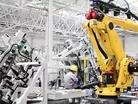Fanuc; The 3 Key Areas For Boosting Productivity

Manufacturing has a bad attitude, at least when it comes to implementing new technologies. In all fairness, perhaps that’s a little harsh. Yet, for anyone who has tried implementing changes to the manufacturing floor, not too far from reality.
When it comes to automation, FANUC is one to listen to, their “lights-out” plant where robots make robots is an industry benchmark. So let’s take a listen.
“There are three key areas that we must focus on if we are to propel UK manufacturing back to its prominent position on the world stage: perceptions of automation, skills & training, and funding,” says Managing director Tom Bouchier.
Perceptions of Industrial Automation
“Perceptions of industrial automation within the UK have long been an obstacle to greater uptake, and a change in attitude of those within manufacturing is vital in instigating wider adoption. The impact of COVID-19 has, to some extent, had an effect on this, but there has to be an ongoing and concerted effort to educate on the numerous benefits of automation.
“This is where skills and training become even more important. On a fundamental level, this relates to ensuring operators are skilled enough to work with the latest technology. It means creating an appealing and viable entry route for those interested in embarking upon a career in manufacturing.”
Robots will not replace humans
“However, there must also be a focus on engaging with and training the existing workforce. There can be a fear factor among many working in manufacturing when it comes to automation and robotics, and this is something that can be addressed through education. Robots replace roles not people, and removing a labour-intensive element of someone’s job, with a new skill such as programming, will offer much more long-term value and purpose.”
Automation and digitisation
“Finally, even when perceptions and skills are at a level high enough to facilitate the adoption of automation, there needs to be the financial incentive to do so. The ROI of the latest equipment means that investment is quickly paid back in productivity gains, but there needs to be a much broader access to funding for those that require initial financial support.”
“Cruelly, SMEs [Small and medium-sized enterprises] are simultaneously the ones who would benefit most from implementing automation, and yet struggle to raise that initial investment, which is why the government must adopt a more bespoke approach to funding these businesses.”
“UK manufacturing will continue to face a number of challenges throughout 2021, not least with the ongoing impact of COVID-19 and the uncertainty surrounding Brexit. Addressing the three key areas outlined above will go a long way to ensuring the success of the industry in the short, medium, and indeed long-term.”
“Above all, it absolutely vital that British businesses understand they are competing on a world stage. They have to be capable of matching the productivity of manufacturers around the globe, and industrial automation is key to this.”
“At a time when the impact of COVID-19 has presented significant challenges to a number of British businesses, we have also seen the resilience of those willing to adapt,” Bouchier said.
There is little arguing that automation and digitisation bring big advantages. From BCG, “Digital leaders achieve earnings growth that is 1.8 times higher than digital laggards—and more than double the growth in total enterprise value.” And yet, their research shows that 70% of digital transformations fall short of their objectives, with only 30% of transformations meeting or exceeded their target value and resulted in sustainable change.
Successful execution isn’t easy. But if failure was ever an option, Covid removed it. BCG offers an excellent report on how COVID-19 will affect machinery and automation and further insights on how to flip your odds.
To check out the cool stuff Fanuc is doing at Audi, click here.

